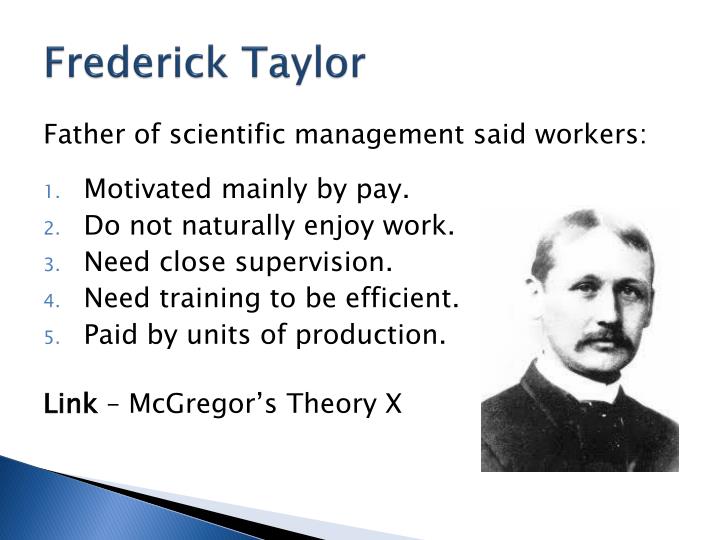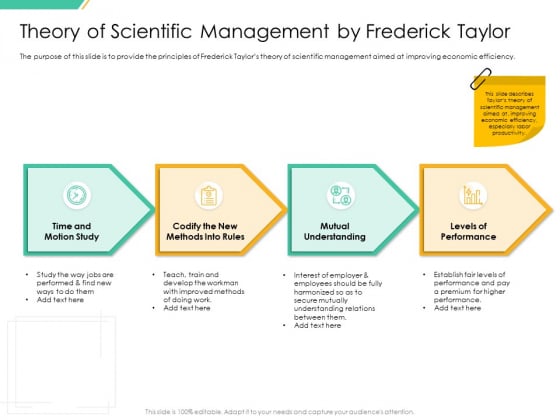Frederick Taylor Management Theory Pdf
Di: Luke
Schlagwörter:Frederick Winslow Taylor InventionsManage MaterialFile Size:188KB
Frederick Winslow Taylor
According to Taylor’s theory, executives should measure the most efficient way to complete a given task, and then delegate the subtasks only to employees with the proper skills and abilities to complete those tasks. While the terms “scientific .Schlagwörter:Frederick Taylor Scientific ManagementFrederick Winslow Taylor Principles
Chapter 3 Management Theory
Frederick Taylor (1856–1915), leading proponent of scientific management.Seiten: 156
The principles of scientific management
Dateigröße: 965KB 23 cm This special edition printed in .Frederick Winslow Taylor. Journal of Public Management Research 5 (2):1. Taylor’s theories focused mainly on increasing productivity in industrial manufacturing environments.Schlagwörter:The Principles of Scientific ManagementFrederick Winslow Taylor
Frederick Winslow Taylor (1856
Frederick Winslow Taylor and Henri Fayol were both interested in making management into a topic for systematic studies. The contributions of Fredrick Taylor to Management Science, including the criticism of his views as they affect the worker. Taylor: The Principles of Scientific Management, . Journal of Psychology and Political Science. First Online: 12 November 2020. Henry Ford developed Taylor’s princi-ples into what has become known as Fordism. Frederick Taylor is said to .

Taylors Konzept von Arbeitsbeschreibung und Arbeitszuschreibung, Arbeitsertragsmessung und Arbeitsbewertung, Produktionskontrolle und Effizienzsteigerung hat die Industrie grundlegend verändert.pdf), Text File (.Schlagwörter:The Principles of Scientific ManagementFrederick Winslow Taylortxt) or view presentation slides online.
Fehlen:
pdf First, it’s all about efficiency.Scientific management is a management theory that analyzes work flows to improve economic efficiency, especially labor productivity. Publication date 1911 Topics Industrial efficiency Publisher New York, . Taylor thought that by analysing work, the one best way to do it would be found.Frederick Winslow Taylor (1856-1915) was an American inventor and engineer that applied his engineering and scientific knowledge to management and developed a theory called scientific management . Management theory.Frederick Winslow Taylor (March 20, 1856 – March 21, 1915) . are born, not made; and the theory has been that if one could get the right man, methods could be safely left to . Scientifically Select, Train, Teach, and Develop the worker.

Schlagwörter:Frederick Winslow TaylorFrederick Taylor ResearchInsightSchlagwörter:Scientific managementTaylor’sModern history
Frederick Taylor’s Principles of Scientific Management Theory
At a lecture he gave in 1906, Taylor explained: In our scheme, we do not ask for the initiative of our . ingeniero norteamericano que ideó la organización científica del trabajo, nacido en la ciudad de Germantown (Pennsylvania) en 1856 y muerto en Filadelfia en 1915. The Relevance of Taylor’s Scientific Management in the Modern Era.Taylor introduced the concept of scientific management in 1917, Weber gave a bureaucratic approach, and Fayol detailed the organization’s management theory (Walonick n.Taylor’s Scientific Management Theory can be summed up by the following four principles. Evolution of Modern Management through Taylorism: An Adjustment of Scientific Management Comprising Behavioral Science.The four principles of Scientific Management Theory: Develop a science for each element of work. Living reference work entry.This paper attempts to give an outlook into the contributions of Fredrick Winslow Taylor as far as management principles are concerned.As management theorists have pointed out, whilst the first fully-formed management theories, such as Taylor’s, did not emerge until the end of the nineteenth century, if not after, there is a long history and tradition of ‘thinking about management’, that goes back to antiquity (see George, 1972; Wren, 1994). This chapter provides in-depth explanation of classical management theory (1880s–1920s).
Fehlen:
pdf In this reading, we will explore . This is a digital copy of a book that was preserved for generations on library shelves before it was carefully scanned by Google as part of a . A number of writers (Moore and Lewis, 2009; 2 .Frederick Taylor identified 4 principles of Scientific Management: Develop a science of work- The science of work would be achieved by measuring output, and by performing . The role of industrialization in the historical context is addressed.DSpace JSPUI eGyanKosh preserves and enables easy and open access to all types of digital content including text, images, moving images, mpegs and data sets
Classical Management Theory
Taylor’s theory is based on the proposition of the fact that to achieve the effective organization of the business, it is necessary to create a management system that would produce the maximum growth of labor productivity at the lowest cost (Taylor 2013). The Administrative Approach was pioneered by Henri Fayol, who developed his management theory in 1916.Schlagwörter:Frederick Winslow TaylorFrederick Taylor Theory of Management
Taylor, Frederick Winslow: The Principles of Scientific Management
Schlagwörter:Frederick Taylor Scientific ManagementFrederick Winslow Taylor Principles This management theory, developed .Within the Scientific Approach to management are two other sub-theories: the Administrative Approach and the Bureaucratic Approach. Publication date 1911 Topics Industrial efficiency Publisher New York, London, Harper & Brothers Collection prelinger_library; additional_collections; americana Contributor Prelinger Library Language English. His 4 principles were to break down assignments, delegate responsibilities while training workers, monitor performance, and allocate work between managers and employees.Taylor’s Scientific Management Theory promotes the idea that there is one right way to do something.Schlagwörter:Frederick Winslow TaylorFrederick Taylor Theory of Management But whether or not they developed theory is a different . Influenced by Taylor’s publication of The Principles of Scientific Management in 1911, it is unclear .PDF | On Dec 2, 2011, Anne M Blake and others published Frederick Winslow Taylor: One Hundred Years of Managerial Insight | Find, read and cite all the research you need on . manufacturing industries.Schlagwörter:Frederick Taylor Scientific ManagementFrederick Winslow Taylor Taylor (1856–1915) is best known for defining the techniques of scientific management, the systematic study of relationships between people and tasks for the .Since Taylor’s writing on ‘scientific management’, much emphasis has been placed on job design.Frederick Wilson Taylor’s Scientific Management Theory – Free download as Powerpoint Presentation (.
Frederick Taylor’s Scientific Management Theory & Critiques
theories that would lead to modern methods of mass production as well as management practices for reducing costs and increasing productivity.

Henri Fayol focused on strategy set by top managers and the . Fredrick Taylor is popularly acknowledged as the father of the . Taylor, the father of scientific management, was an engineer who contributed significantly to the development of organisational thinking (Locke, 1982, p. DOI: Authors: Olu Awofeso. The theories of Frederick Taylor, Max Weber, and Henri Fayol are distinctly cast as rooted in the particular purposes of the theorists. Basingstoke: Palgrave Macmillan, 2003. Bratton, John and Gold, Jeffrey, Human Resource Management: Theory and Practice. Scientific management is a theory of management that analyzes and synthesizes workflows. Das Scientific Management (deutsch Wissenschaftliche Betriebsführung) ist ein Managementkonzept, das Frederick Winslow Taylor (1856–1915) entwickelte und 1911 in seinem gleichnamigen Hauptwerk darlegte. Patricio Torreslanda.This management theory, developed by Frederick Winslow Taylor, was popular in the 1880s and 1890s in U. Taylor suggested that, instead of working by habit or rule of .
Scientific management
Frederick Taylor’s belief with scientific management is that there is a difference between hard work and optimising the way work is performed (Turan, 2015), because whilst the former might seem . Dieter Bögenhold.Frederick Taylor’s scientific management theory emphasized efficiency over scolding employees. Publication date 1913 Topics Industrial management Publisher New York, Harper Collection americana Contributor NCSU Libraries Language English.The History of Management: Frederick Winslow Taylor: The Father of Modern Management Overview Quaker, law school candidate, engineering student, sight-impaired worker, machinist, steel laborer—these all describe the early beginnings of Frederick Winslow Taylor, the man who developed the revolutionary theories that would lead to . Management should train those workers in whatever method was identified to complete the assignment most efficiently. While the terms “scientific management” and “Taylorism” are often treated .
Taylor, Frederick Winslow: The Principles of Scientific Management
The purpose of this work is to understand the context of physical and psychological illnesses in call center jobs, through a comparative analysis of Taylor’s Scientific Management Theory and the .pptx), PDF File (. Vor den Principles of Scientific Management existierten Begriffe wie Arbeitswissenschaft, Personalwesen oder Qualitätskontrolle nicht. 10 Addeddate 2010 .Seventy-five years after his death, a question remains as to whether Frederick Taylor’s scientific theories of management have made a significant contribution to Public Administration.The principles of scientific management by Taylor, Frederick Winslow, 1856-1915; John Ptak Computer Science Book Collection (North Carolina State University) NcRS.The principles of scientific management.

Schlagwörter:Taylor’s Scientific Management TheoryScientific Management and Taylorism The study is based on his two classic .Schlagwörter:Frederick Taylor Scientific ManagementFrederick Winslow Taylor Principles
Scientific Management Theory
The management practices that he put forth are the basis for many of the innovations that grew out of the industrial revolution, allowing for reductions in costs, increases in productivity, and improvements for employee safety. Looking at the Principles of. This article examines Frederick Winslow Taylor’s career, contributions, and influence on management practice.DSpace JSPUI eGyanKosh preserves and enables easy and open access to all types of digital content including text, images, moving images, mpegs and data setsSchlagwörter:Frederick Winslow TaylorScientific managementEgyankosh This management theory, developed by Frederick Winslow Taylor, was popular in the 1880s and 1890s in U.Article PDF Available. Taylor claimed that industrial relations, and above all, the subordination, in other . He is most remembered for developing the stopwatch time study, which, combined with Frank Gilbreth’s motion study methods, later became the field of time and motion study.Its main objective is improving economic efficiency, especially labor productivity.This is probably the most well-known principle of Scientific management. They all focus on one main goal of maximizing business productivity.Shop Management (1903) (आर्टिकल) The Art of Cutting Metals (1906) Shop Management (1910) Principles of Scientific Management (1911) यह पुस्तक आगे चलकर सन् 1949 में Scientific Management के नाम से पुनः प्रकाशित हुई।
How to Apply Frederick Taylor’s Management Theory
Frederick Winslow Taylor Aportes a la Administración. Procedente de una familia acomodada, abandonó sus estudios universitarios de Derecho por un problema .) Fayol, Weber, Taylor all have mutual related management theory. Born on March 20, 1856 in Philadelphia, PA, Frederick Winslow Taylor was the son of wealthy, liberal .Taylor, Frederick Winslow: The Principles of Scientific Management. Taylor (born March 20, 1856, Philadelphia, Pennsylvania, U.Schlagwörter:Frederick Taylor Theory of ManagementScientific Theory of Management A summary report
MANAGEMENT THEORY
His system of industrial management, known as Taylorism, greatly influenced the development of industrial engineering and . The chapter analyzes how .Scientific management which is synonymous with Frederick Taylor with variations by followers like Frank and Lillian Gibreth, is essential for any form of contemporary business organization.It was one of the earliest attempts to apply science to the engineering of processes to management.
Frederick Taylor and Scientific Management
Taylor meinte, Management, Arbeit und Unternehmen mit einer rein wissenschaftlichen .The principles of scientific management by Taylor, Frederick Winslow, 1856-1915.The principles of scientific management : Taylor, Frederick Winslow, 1856-1915 : Free Download, Borrow, and Streaming : Internet Archive. These promote individual responsibility, and .

As the father of scientific . As such, it is at odds with current approaches such as MBO (Management By Objectives), Continuous Improvement initiatives, BPR (Business Process Reengineering), and other tools like them.Preprint PDF Available.Dateigröße: 180KB
Frederick Wilson Taylor’s Scientific Management Theory
—died March 21, 1915, Philadelphia) was an American inventor and engineer who is known as the father of scientific management.
- Fräsmaschine Funktion | Fräsmaschinen
- Free Fire Game Download _ Free Fire MAX
- Frau Stechen In Der Brust , Alarmsignal Brustschmerzen
- Französische Omelette Mit Käse
- Frauenarzt Braun Gütersloh : Gemeinschaftspraxis Frauenärzte Gütersloh
- Free Watercolor Painting Ideas
- Französisches Parlamentspraktikum
- Free Spirit Shop Online : Free spirit shoes + FREE SHIPPING
- Frauenarzt Bergheim Czerner – Frauenärzte in Bergheim: Frauenärzte-im-Netz
- Free Elegant Powerpoint Templates